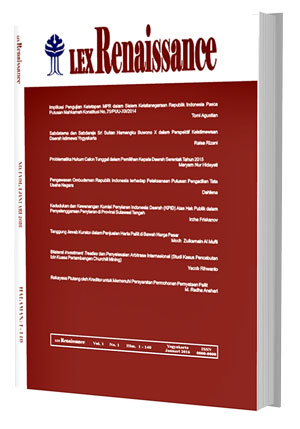Main Article Content
Abstract
Keywords
Article Details
Authors who publish with this journal agree to the following terms:
a. Authors retain copyright and grant the journal right of first publication with the work simultaneously licensed under a Creative Commons Attribution License that allows others to share the work with an acknowledgement of the work's authorship and initial publication in this journal.
b. Authors are able to enter into separate, additional contractual arrangements for the non-exclusive distribution of the journal's published version of the work (e.g., post it to an institutional repository or publish it in a book), with an acknowledgement of its initial publication in this journal.
c. Authors are permitted and encouraged to post their work online (e.g., in institutional repositories or on their website) prior to and during the submission process, as it can lead to productive exchanges, as well as earlier and greater citation of published work (See The Effect of Open Access).References
- Buku
- Adjie, Habib, Hukum Notaris Indonesia Tafsir Telematik terhadap Undang-Undang Nomor 30 Tahun 20004 tentang Jabatan Notaris, Refika Aditama, Bandung, 2008.
- Anand, Ghansham, Karakteristik Jabatan Notaris di Indonesia, Kencana, Surabaya, 2018.
- Fatahna, Muchlis dan Joo Purwanto, Notaris Bicara Soal Kenegaraan, Watampone Press, Jakarta, 2003.
- Fuady, Munir, Perbandingan Ilmu Hukum, Refika Aditama, Bandung, 2007.
- World Health Organization, World Report on Disability, World Health Organization, Geneva, 2011.
- Makalah
- Budiono, Herlien, “Notaris dan Kode Etiknya”, Makalah pada Upgrading dan Refreshing Course Nasional Ikatan Notaris Indonesia, Medan, 2007.
- Thaw, Deborah M., “The Notary Public and its Impact in 21st Century”, Makalah dalam presentasi di NACO/NACRC Annual Conference, 2000.
- Internet
- Karwelo, Erlina Saktiani, “Prospek Pembacaan dan Penandatangan Akta Notaris Melalui Video Conference”,http://hukum.studentjournal.ub.ac.id/index. php/hukum/article/view/721/70, diakses tanggal 20 September 2019.
- “Menakertrans: Buka Kesempatan Kerja yang Luas untuk Penyandang Cacat”,https://www.republika.co.id/berita/nasional/umum/12/12/09/merigb-menakertrans-buka-kesempatan-kerja-luas-bagi-penyandang-cacat/, diakses tanggal 4 Juli 2019.
- “Undang-UndangHukum Notaris Jepang”, http://www.japaneselawtranslation.go.jp/law/detail/?ft=1&re=2&dn=1&x=0&y=0&co=01&ia=03&ja=04&ky=notary&page=18, diakses tanggal 2 Juli 2019.
- Peraturan Perundang-undangan
- Undang-Undang Dasar Negara Republik Indonesia Tahun 1945.
- Kitab Undang-Undang Hukum Perdata Indonesia.
- Undang-Undang Nomor 8 Tahun 2016 tentang Penyandang Disabilitas.
- Undang-Undang Nomor 2 Tahun 2014 tentang Perubahan atas Undang-undang Nomor 30 Tahun 2004 tentang Jabatan Notaris.
References
Buku
Adjie, Habib, Hukum Notaris Indonesia Tafsir Telematik terhadap Undang-Undang Nomor 30 Tahun 20004 tentang Jabatan Notaris, Refika Aditama, Bandung, 2008.
Anand, Ghansham, Karakteristik Jabatan Notaris di Indonesia, Kencana, Surabaya, 2018.
Fatahna, Muchlis dan Joo Purwanto, Notaris Bicara Soal Kenegaraan, Watampone Press, Jakarta, 2003.
Fuady, Munir, Perbandingan Ilmu Hukum, Refika Aditama, Bandung, 2007.
World Health Organization, World Report on Disability, World Health Organization, Geneva, 2011.
Makalah
Budiono, Herlien, “Notaris dan Kode Etiknya”, Makalah pada Upgrading dan Refreshing Course Nasional Ikatan Notaris Indonesia, Medan, 2007.
Thaw, Deborah M., “The Notary Public and its Impact in 21st Century”, Makalah dalam presentasi di NACO/NACRC Annual Conference, 2000.
Internet
Karwelo, Erlina Saktiani, “Prospek Pembacaan dan Penandatangan Akta Notaris Melalui Video Conference”,http://hukum.studentjournal.ub.ac.id/index. php/hukum/article/view/721/70, diakses tanggal 20 September 2019.
“Menakertrans: Buka Kesempatan Kerja yang Luas untuk Penyandang Cacat”,https://www.republika.co.id/berita/nasional/umum/12/12/09/merigb-menakertrans-buka-kesempatan-kerja-luas-bagi-penyandang-cacat/, diakses tanggal 4 Juli 2019.
“Undang-UndangHukum Notaris Jepang”, http://www.japaneselawtranslation.go.jp/law/detail/?ft=1&re=2&dn=1&x=0&y=0&co=01&ia=03&ja=04&ky=notary&page=18, diakses tanggal 2 Juli 2019.
Peraturan Perundang-undangan
Undang-Undang Dasar Negara Republik Indonesia Tahun 1945.
Kitab Undang-Undang Hukum Perdata Indonesia.
Undang-Undang Nomor 8 Tahun 2016 tentang Penyandang Disabilitas.
Undang-Undang Nomor 2 Tahun 2014 tentang Perubahan atas Undang-undang Nomor 30 Tahun 2004 tentang Jabatan Notaris.




